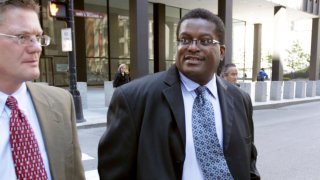
A previously secret report from Chicago’s Civilian Office of Police Accountability paints a grim picture of the practices of a group of police officers accused of framing scores of South Side residents.
The COPA report was tendered as a result of an ongoing open records lawsuit filed by attorneys for Ben Baker, who insisted he had been framed by disgraced Chicago Police Sgt. Ronald Watts and the tactical team he commanded. While heavily redacted, it shows that investigators discovered discrepancies in reports filed by Watts and his officers, including two arrests where the same officers claimed to be in different places at the same time.
Shortly after his 2005 arrest at the former Ida B. Wells housing project, Baker and his wife Clarissa Glenn both gave statements to the Chicago Police Bureau of Internal Affairs, the Cook County State’s Attorney’s office and the FBI, detailing allegations of corruption by Watts and the officers on his team.
COPA investigators interviewed the former chief of the State’s Attorney’s Public Integrity Bureau, who met with Baker and Glenn following their arrest and told investigators that he found the couple "credible."
Feeling out of the loop? We'll catch you up on the Chicago news you need to know. Sign up for the weekly Chicago Catch-Up newsletter here.
Baker was freed from prison in 2016, after successfully fighting to have his conviction overturned.
Similar allegations of corruption by Watts and his team have prompted authorities to throw out the convictions of scores of other defendants. In the fall of 2017, 10 Watts officers were named in a letter from the Cook County States Attorney’s office, advising CPD that due to concerns about their credibility, the officers would never be called again as witnesses in any criminal case.
In 2012, Watts and one of his officers, Kallatt Mohammed, both were charged and eventually convicted in the scandal. But the remaining officers on Watts’ team continued their work with CPD, and most remain on the force today.
Local
The 33-page COPA report, which was forwarded to Supt. David Brown last March but never publicly released, includes interviews with two accused members of Watts’ crew. The reports notes that one of those officers, Sgt. Alvin Jones, is the subject of misconduct complaints in 64 pending federal lawsuits. Jones was stripped of his police powers last June, records show.
The document includes 23 allegations against Jones, but COPA’s findings in relation to those allegations are redacted in the report.
In fact, more than 11 pages of the document are completely blacked out, including the investigative agency’s discussion of the charges and its recommendations for discipline.
The report notes that when queried specifically about planting drugs on Baker or in his car during the 2005 arrest, Watts asserted his Fifth Amendment privilege against self-incrimination. Mohammed, the report notes, also took the Fifth in declining to answer questions about a subsequent arrest.
The COPA report said the FBI reopened a prior investigation of Watts’ team in 2007 after obtaining information about alleged corruption from other Chicago police officers.
“FBI records show agents received a report that Team members were extorting payments from drug dealers,” the report states. “The records note that the Team’s scheme involved using narcotics collected in ‘tax’ to frame dealers who refused to pay.”
The COPA document references an FBI report dated November 19, 2010, which indicated that in addition to Watts, federal investigators believed that “other officers were directly involved in the extortion of drug dealers’ funds.”
The COPA investigators noted that they reviewed thousands of pages of documents and interviewed many individuals who claimed direct knowledge of the alleged corruption.
“Many witnesses who COPA investigators interviewed have no claim against the City and no apparent interest at stake,” they noted.
One of those witnesses, Van Jordan, who the report says admitted involvement in the drug trade, stated that a Watts officer routinely came to his apartment to demand drugs, and that Team members made hundreds of similar demands over the course of several years.
Another resident, Charles Miller, said that one of the accused officers rewarded him for providing information by telling him where to find stashed narcotics for his personal use.
Still another admitted dealer, Harold Owens, told COPA investigators he gave drugs to Team members on several occasions to avoid arrest. Another, Jerome Jointer, described instances in which he gave guns to Watts’ officers.
After being sent to Brown last March, the report has subsequently wended its way to the Chicago Department of Law and back to COPA for revisions. Fourteen months after it was tendered by the police investigative agency, it is unclear when the superintendent may address the COPA recommendations.
The redacted report can be read below:



